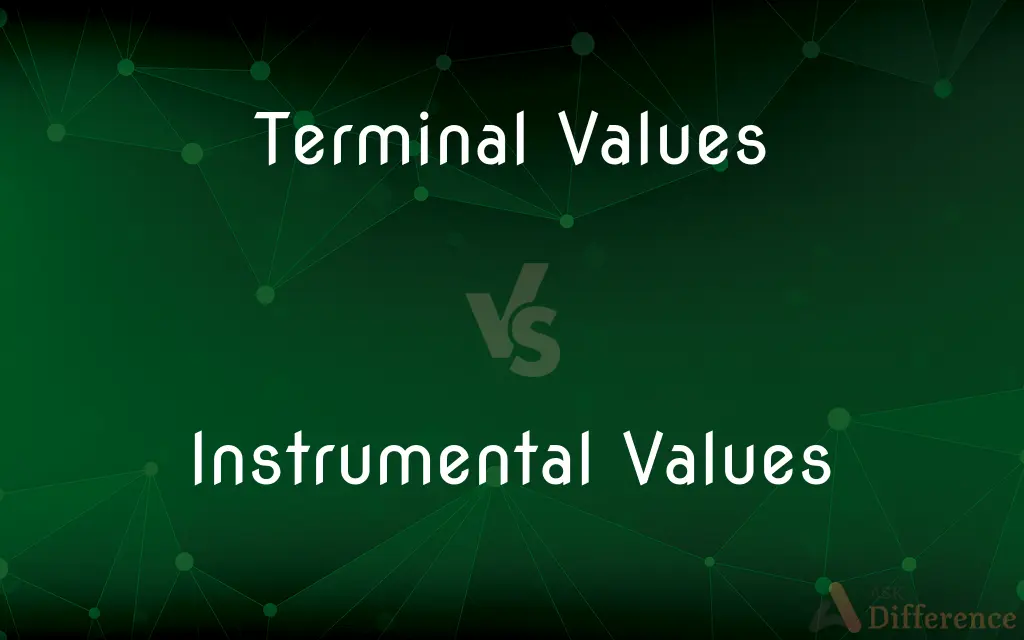Terminal Values vs. Instrumental Values — What's the Difference?
By Tayyaba Rehman — Published on November 25, 2023
Terminal Values are end-goals in life, like happiness or success, while Instrumental Values are means or actions that guide behavior towards achieving terminal values, like honesty and diligence.

Difference Between Terminal Values and Instrumental Values
Table of Contents
ADVERTISEMENT
Key Differences
Terminal Values signify the desired end-state or life goal that individuals strive to attain, such as achieving prosperity, societal recognition, or a contented life. They embody the ultimate objectives that one wishes to achieve, often driving overarching life decisions and general perspectives. Instrumental Values, on the other hand, represent the means or methodologies that people adopt in their pursuit of terminal values. Instrumental values encompass traits or behaviors like honesty, ambition, or loyalty, essentially forming the ethical and behavioral guidelines that individuals employ to attain their terminal values.
The distinction between Terminal Values and Instrumental Values often dictates an individual's life trajectory, shaping their actions, reactions, and endeavors. Terminal Values, such as self-fulfillment and familial security, operate as the pinnacle goals steering various life choices and pursuits. Meanwhile, Instrumental Values serve as the conduit through which these pinnacle goals are realized. They essentially shape the behavior and delineate the moral and ethical boundaries within which individuals navigate their path toward their terminal values.
In the context of organizational behavior, Terminal Values often form the foundation of an entity's mission and vision, delineating the ultimate aims the organization endeavors to realize. They can include objectives like industry leadership, customer satisfaction, or financial success. Instrumental Values, in contrast, infuse the organizational culture and ethos, dictating the behaviors, practices, and ethical standpoints that the organization and its members employ to realize the outlined terminal values.
Within sociological and psychological contexts, Terminal Values often mirror an individual's or group's intrinsic aspirations and are typically stable over time due to their deep-rootedness in personal belief systems and overarching life objectives. Instrumental Values, conversely, while also rooted in personal belief systems, may exhibit a degree of flexibility, adjusting to serve the optimal path towards achieving terminal values in varying circumstances and contexts.
Understanding the dynamic between Terminal and Instrumental Values is crucial for comprehending human motivation, ethical perspectives, and decision-making processes. Terminal Values provide the 'why' – the ultimate objectives, while Instrumental Values inform the 'how’ - the conduct and actions employed to navigate the journey toward those objectives, both serving pivotal roles in shaping individual and organizational trajectories.
ADVERTISEMENT
Comparison Chart
Definition
End-goals or life objectives
Means to achieve end-goals
Nature
Desirable end-states
Desirable traits/behaviors
Stability
Typically stable
May exhibit flexibility
Example
Achieving inner harmony
Exhibiting honesty
Role in Decision-Making
Dictate overall direction
Guide behavior/conduct
Compare with Definitions
Terminal Values
Terminal Values are deeply rooted in belief systems.
Spiritual individuals often hold enlightenment as a key terminal value.
Instrumental Values
Instrumental Values dictate behavior towards goals.
Practicing diligence, an instrumental value, can lead to academic success.
Terminal Values
Terminal Values refer to desired end-states.
Achieving peace is a terminal value sought by many.
Instrumental Values
Instrumental Values are ethical or moral conduct guidelines.
Honesty, an instrumental value, often fosters trust in relationships.
Terminal Values
Terminal Values provide intrinsic motivation.
The desire for societal progress is a terminal value motivating activists.
Instrumental Values
Instrumental Values guide actions towards terminal values.
Employing ambition, an instrumental value, facilitates career advancement.
Terminal Values
Terminal Values act as ultimate life goals.
Some people prioritize happiness as their paramount terminal value.
Instrumental Values
Instrumental Values may be adapted to different contexts.
Altruism, an instrumental value, might manifest differently in varied situations.
Terminal Values
Terminal Values can influence major life decisions.
Valuing family harmony can shape one’s career choices and lifestyle.
Instrumental Values
Instrumental Values can impact interpersonal relations.
Demonstrating empathy, an instrumental value, often enhances friendships.
Common Curiosities
Do everyone’s Terminal Values and Instrumental Values align?
Not necessarily, as values can be deeply personal and influenced by various cultural, societal, and personal factors.
What are Terminal Values?
Terminal Values are the ultimate goals or objectives individuals strive to achieve.
Can Terminal Values change over time?
They can, although they are typically quite stable due to their deep rooting in personal belief systems.
Can Instrumental Values conflict with one another?
Yes, sometimes different instrumental values (e.g., ambition and altruism) might guide conflicting behaviors.
Do Terminal and Instrumental Values affect career choice?
Yes, values often influence career paths, dictating the sectors, roles, and environments one might gravitate towards.
Are values subjective?
Yes, what one might prioritize in terms of Terminal and Instrumental Values can be highly individual and subjective.
Can an action be influenced by both Terminal and Instrumental Values?
Yes, terminal values often determine the ‘goal’ and instrumental values guide the ‘action’ or behavior towards it.
How do Instrumental Values function?
Instrumental Values act as means, guiding behavior and actions towards achieving terminal values.
Are Terminal Values linked with long-term objectives?
Generally, yes. Terminal Values often align with overarching, long-term life goals and objectives.
Can societal norms influence Terminal and Instrumental Values?
Definitely, societal expectations, norms, and cultural contexts can significantly shape one's values.
Are Instrumental Values always ethical in nature?
Often, as they generally encompass moral and ethical behaviors and traits utilized to achieve terminal values.
Can organizations have Terminal and Instrumental Values?
Absolutely, organizations often define these to shape their culture, strategy, and operational approach.
How do Instrumental Values influence daily decision-making?
Instrumental Values guide everyday behaviors and decisions by providing a moral or ethical framework to operate within.
Is it important to define your Terminal Values?
Typically yes, as understanding them can provide clarity, direction, and motivation in life and endeavors.
Can conflicts arise due to differing Terminal Values?
Yes, individuals or groups with misaligned Terminal Values can experience conflicts or disagreements.
Share Your Discovery

Previous Comparison
Puppet vs. Puppet Enterprise
Next Comparison
A4 vs. Legal Paper SizeAuthor Spotlight
Written by
Tayyaba RehmanTayyaba Rehman is a distinguished writer, currently serving as a primary contributor to askdifference.com. As a researcher in semantics and etymology, Tayyaba's passion for the complexity of languages and their distinctions has found a perfect home on the platform. Tayyaba delves into the intricacies of language, distinguishing between commonly confused words and phrases, thereby providing clarity for readers worldwide.













































